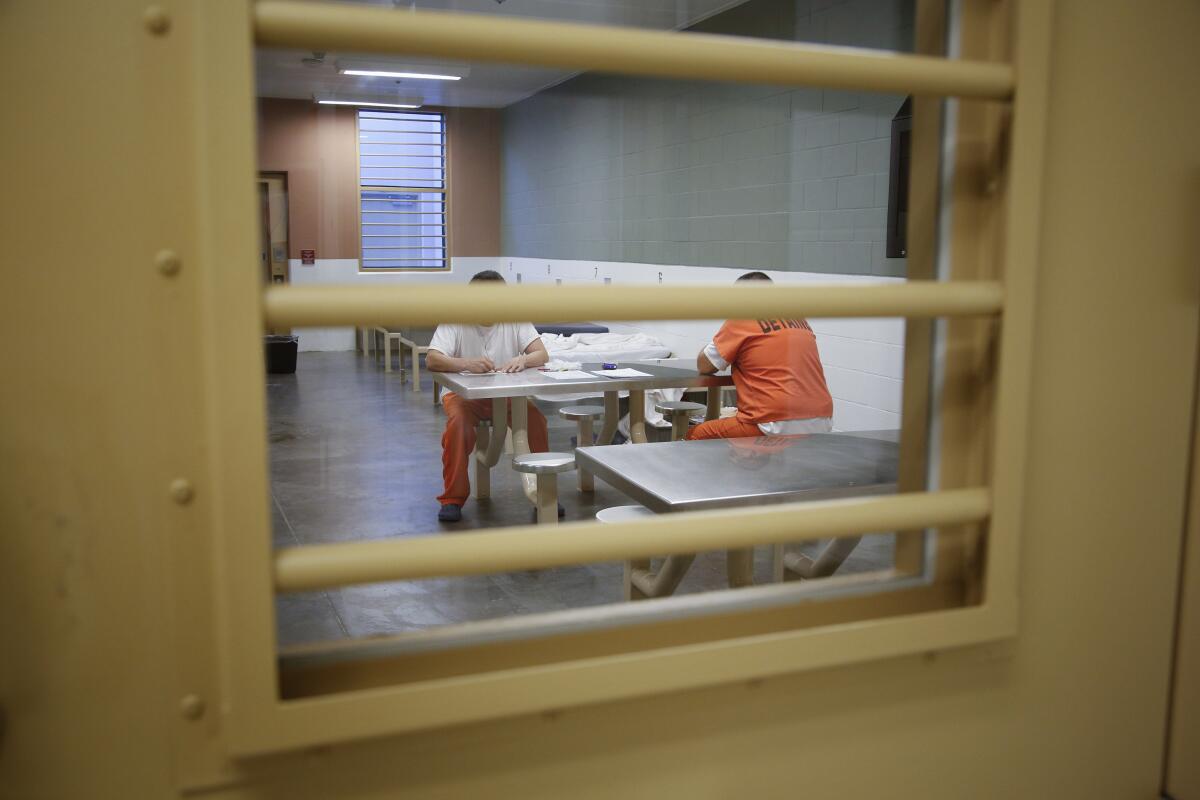Otay Mesa detainees say shift of health services to private contractor complicates care

- Share via
SAN DIEGO — After spending the first part of the pandemic in the spotlight for a large COVID-19 outbreak at Otay Mesa Detention Center, Immigration and Customs Enforcement has contracted out medical care at the facility to the private prison company that owns and operates it.
Detainees interviewed by the San Diego Union-Tribune say the medical care, which they and their advocates already had criticized , has grown even worse under the private operator CoreCivic than it was under ICE.
Detainees complain of missed and late medications, multiple-day waits for medical attention and a lack of transfer of records that left staff in the dark about what treatment individual detainees were supposed to be receiving. It has also meant that those who had been approved for specialty care, such as oncology and orthopedics, would have to begin the lengthy process anew.
“The first couple of days, it was chaos,” said Guillermo Alvarez Mendoza, a detainee with diabetes, hypertension and chronic back pain. “If you were getting your blood sugar checked two or three times a day, it was midnight before they came for the first blood-sugar check.”
Both CoreCivic and ICE denied the detainees’ allegations.
“Our clinic is staffed with licensed, credentialed doctors, nurses and mental health professionals who contractually meet the highest standards of care,” said Amanda Gilchrist, spokeswoman for CoreCivic. “CoreCivic also maintains several accreditations from nationally recognized industry leaders such as the American Correctional Assn., the National Commission on Correctional Health Care and the Joint Commission on Accreditation of Healthcare Organizations, which ensures we meet the highest standards for healthcare delivery.”
She said that detainees with chronic health conditions are regularly monitored and that all detainees are able to sign up for sick call daily.
Lauren Mack, aspokeswoman for ICE, called the transition “seamless.”
“The health, safety and welfare of those in our care remain a top priority and concern for the agency, regardless of the medical service provider,” Mack said.
The Otay Mesa facility still has a reduced number of ICE detainees because of the pandemic — currently about 330, the agency said.
CoreCivic proposed the switch in the second quarter of 2020, Gilchrist said, and ICE agreed to it. It was not immediately clear how much ICE is paying CoreCivic for the services, which they took over Sept.10 after a 90-day transition period.
An ICE official speaking on background said that the shift was seen as a positive change, and detainees will receive the same level and standard of care.
CoreCivic received medical summaries from ICE and has a way to request additional records on an as-needed basis, Gilchrist said.
But detainees tell a different story.
“They didn’t know none of our doses, none of our medications, what we actually needed, what was prescribed to us,” Alvarez Mendoza said. “They would ask us, ‘What are you supposed to take right now?’”
After several days of not receiving any of the medications he was supposed to get, Alvarez Mendoza said, medical staff showed up with some of his meds. Others, particularly his prescribed pain medications, were missing. In protest, he refused to take what had been brought.
ICE maintained that Alvarez Mendoza had access to his medications throughout the transition and said that he had refused his medications eight times.
Alvarez Mendoza, who had a green card, was transferred to ICE custody from state prison after serving a couple of decades for a carjacking conviction, according to ICE. He’s waiting on an appeal of his immigration case.
“The time that I’ve spent in ICE custody is weighing a lot more than the time I did in prison,” Alvarez Mendoza said. “I’d rather be back in state. That’s how sorry and pitiful they treat you.”
Several detainees in another housing unit had similar complaints.
Alvarez Mendoza said he’d been diagnosed with a tumor in his testicle about a month ago. He was then supposed to see another specialist to address the issue.
But when the changeover happened, the medical staff no longer had records of the referrals, he said. And now he’s being given the same diagnostic tests that he already had, essentially starting the process over again.
“Now I have to wait more time,” Mendoza said in Spanish. “I tell them I have a tumor, and it doesn’t seem important to them.”
Jose Hernandez had a similar experience. He was injured while being transferred on a bus between ICE facilities, he said, because he was handcuffed and in the bathroom when the vehicle stopped suddenly.
He’d been seeing a specialist in orthopedics at an ICE facility in Alabama for the shoulder injury, but when he was sent to Otay Mesa, he had to push for a year before he was taken to a specialist. Now that CoreCivic is in charge of medical care, he’s had to start the process over a second time, he said.
He had hoped medical care might get better with the change, he said.
“But it’s not,” Hernandez said. “It’s worse.”
Jose Antonio Espinoza said that it took the facility five days to see him after he signed up for sick call because he had pus coming out of his ear.
He’s also on a blood-pressure medication, which he’s supposed to take right before dinner, he said. Sometimes medical staff bring the medication at 3 a.m., other times at 9 p.m.
“They said it’s because there’s no staff,” Espinoza said.
Jose Manzo Alvarez said he stopped receiving his blood-pressure medication after the transition happened. Staff told him they had ordered more by mail but that it hadn’t arrived yet, he said.
“I’m a very patient person, but I figured it’s time to let somebody know,” Manzo Alvarez said.
ICE said it could not comment on these additional individual allegations without having identification numbers for each detainee. CoreCivic deferred to ICE on individual cases.
Morrissey writes for the San Diego Union-Tribune.
More to Read
Sign up for Essential California
The most important California stories and recommendations in your inbox every morning.
You may occasionally receive promotional content from the Los Angeles Times.











